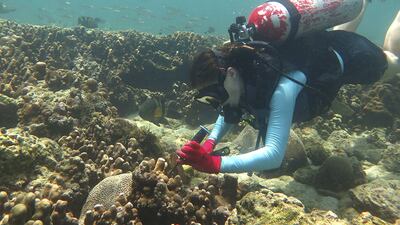Researchers are one step closer to seeing if Arabian Gulf corals provide a lifeline for coral reefs worldwide under threat from rising sea temperatures.
The Arabian Gulf’s high salinity and temperatures provide scientists with a unique living laboratory in the fight against climate change.
NYU Abu Dhabi researchers performed DNA analysis on corals collected from reefs in the Arabian Gulf near Abu Dhabi and from sites in the slightly cooler Gulf of Oman around Fujairah and Muscat.
The purpose of the research is to map out the genome of coral reefs in the Gulf and study what gives them the ability to tolerate and survive the salinity and harsh conditions that other reefs could suffer from.
Results will help scientists better understand the super gene which makes them tolerant to temperatures around 36C and determine if coral reefs around the world have a better chance of coping with global warming.
_________________
Read more:
Surveillance of our coral reefs could benefit oceans worldwide
Arabian Gulf may hold key to coral survival
_________________
The coral samples from the two Gulf seas revealed important differences. The Arabian Gulf corals and their algae were found to be genetically distinct from their counterparts in Gulf of Oman.
NYUAD researcher Dr Emily Howells previously carried out studies with researchers at Zayed University in Abu Dhabi and Oregon State University in the United States, that revealed genetic differences between corals living off Abu Dhabi’s Saadiyat Island (in the very warm Arabian Gulf) and corals off Fujairah (in the slightly milder Gulf of Oman).
The findings had also showed that corals off Abu Dhabi had indeed adapted genetically to warmer conditions.
The researchers at NYUAD also studied the algae that live in the coral tissue to discern why the corals are different and what changed to allow them to survive in such high temperatures.
A new study published in the scientific journal PLOS On investigated the genetic structure of the coral platygyra daedalea and algae in the Arabian Gulf and the Gulf of Oman.
“This will help us understand the mechanisms involved in coral thermal adaptation, and provide new insight into whether corals elsewhere in the world will be able to cope with climate change,” said Edward Smith, postdoctoral associate researcher at NYU Abu Dhabi.
“Once we can understand that then we can look at corals elsewhere to say that maybe certain regions or certain types of corals share biological similarities with those that we find within the Gulf.”
Coral reefs are under intense pressure from climate change. When sea temperatures rise, corals expel the algae living in their tissues, causing the coral to turn white. The phenomenon known as coral bleaching occurred on a mass scale in Australia on the Great Barrier Reef and experts expect continued damage in coming years.
Although coral reefs cover only less than one per cent of the world’s sea, a quarter of the marine species are found on the corals.
Arabian Gulf coral reefs are the most diverse ecosystems in the region and support economic industries such as fisheries.
“Unfortunately, the conditions that have made Arabian Gulf corals among the hardiest known to science, also makes them vulnerable: they are living in very stressful conditions, and any further stress can push them over the edge”, said John Burt, NYUAD associate professor of biology.
“In the past three decades we’ve witnessed widespread degradation of reefs around the region, with sedimentation from coastal development and nearshore reclamation being the prime culprits,” he said.
“If we are to conserve these scientifically and economically important natural assets, management efforts to limit human stressors are critical.”

